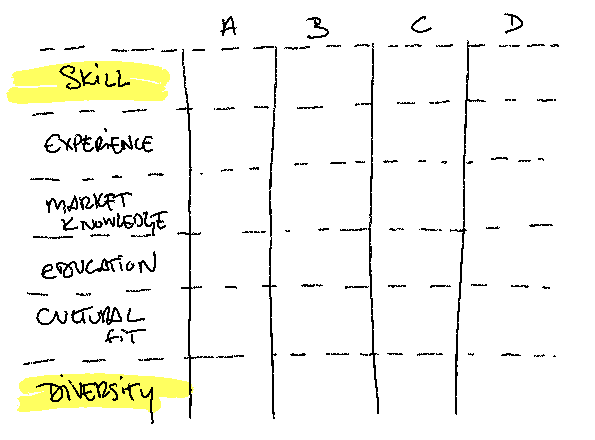CEOs who say that Diversity should not override Merit in the hiring process, like Frank Slootman (Snowflake) in this Bloomberg interview, are spreading the wrong message.
The right fit
When you are looking for candidates for a new role, you are looking at a set of competencies that make a person the best fit for the role. The thing is, merit already is not the only thing you look for. You look for education, past experiences, market knowledge, cultural fit, … and nobody is equal on all accounts.
There is a different priority for every role in which feature of a person will get a bigger priority than others. If you are looking for an extremely difficult task, you may indeed be looking for the best skills. But when you are in a Product Management organization, you will put more emphasis on someone with market experience. In Sales, you may give someone that worked for a competitor a better overall score because they bring in the knowledge you didn’t have before. None of these traits have anything to do with actual ‘merit’. Maybe even one of their hobbies provides an added value to the team.
You will also (hopefully) not select a candidate with the highest skills but that is just not a cultural fit. So why would these features be any different from the diversity of experience and view when it comes to overriding merit?
Diversity is an exponential BONUS feature
New ideas are formed by combining past experiences into a newly formed pattern. This is the baseline of all innovation. The thing is, if everyone has the same experience, you can only get one idea. You don’t need more confirmation of the same idea, you need more ideas!
The fact is that you are already doing this. If you put an emphasis on experience with competitors, you’ll look for as many competitors as possible. If you are looking for market experience, you’ll look for people in the markets you need to grow, not the ones you are already winning at.
The same applies to team diversity. The more homogenous your team is, the higher the priority in the diversity column. So next time someone says diversity shouldn’t override merit, you say HELL YES it should!
BONUS RANT: if 99% of applicants with the same skills are white males and only 1% is not, those percentages of applications do not matter because you only need to fill 1 vacancy! Just 1 applicant is enough. But if you can’t find that 1% to apply, that’s on YOU!
DEI statement
You cannot always create the perfect team. But can aspire to do so! What follows is the DEI statement I wrote for Extra Horizon as its CEO:
“We acknowledge that we have a team that does not fairly represent the diversity we hope to achieve one day. Throughout all our ranks, we will continuously make the necessary efforts to increase the diversity of experience while also making sure everyone can feel represented without having to think about it.
In the meantime, we focus heavily on making our workplace a safe space for you to be(come) successful. In our daily work, we emphasise on every voice being heard equally, and one of our core values “I already have permission” is specifically set up to empower everyone in their respective roles without unnecessary oversight. We don’t care about horizontal or vertical structures, but we do care about bottom-up empowerment!
Lastly, we deeply respect every person as an individual with their individual needs and challenges. Extra Horizon can only be a healthy organisation when its people are physically and mentally in a happy place and start each workday fully motivated. Every day should be a better day than the one before.”
Further Reading
34 types of diversity for the work environment
Effects of Diversity Experience on Critical Thinking Skills
footnote: I have purposefully not touched the types of diversity in this post as I did not want to focus on gender, or race, or any other form of minority equality. Sometimes even that type of diversity itself is the added value. And don’t get me started on the fact that I find women way better managers than men for example! The links above here do that better than I could.
footnote2: etymologically merit comes from being ‘deserving’ and even today the word itself technically represents being worthy. In this context however, I have used it as a set of skills because that is the way in which is it used by the people making the comparison. If it were used in case of worthiness I hope I have made it clear enough that diversity is just a part of merit and then there would just not (have to) be a discussion.


I’m really glad you’re writing about this! I think that it’s important for people to understand how important diversity is. Also, I appreciate outsourcing this process because it helps keep costs down while also taking care of everything from start to finish.
Hi Nora, thx. I feel that the discussion about diversity is too much focussed on forcing equality of opportunity and outcome, and not enough about the strenghts that actually brings to a company. That’s why I’m trying to flip the narrative here. When you focus on those strengths, you’ll naturally end up with equality of outcome!
In that light I have to disagree with your outsourcing perspective. The thing an outsourcing team can do is making sure equality of opportunity gets its due process. But they hardly ever (in my experience) have the proper sensitivity towards how much the individuality of a person through their diversity is an add-on for a team.
So my view would be the exact opposite: INsource your process. Just check up that your due process is solid.